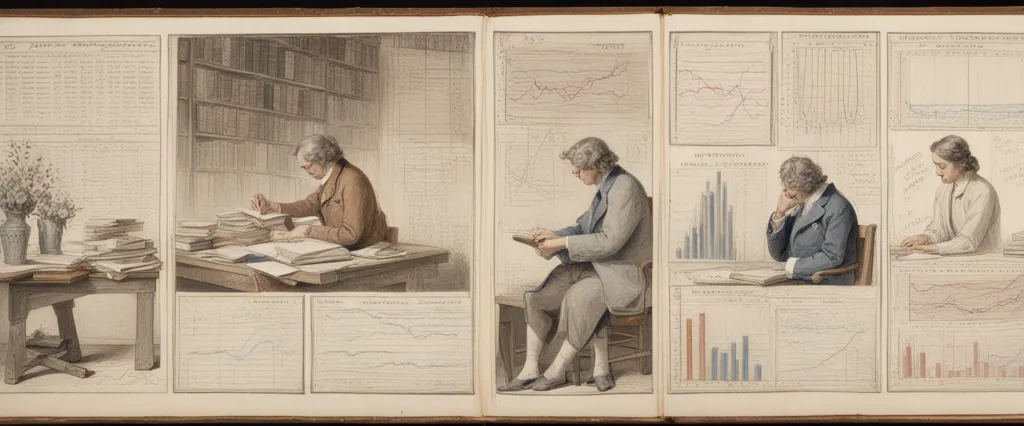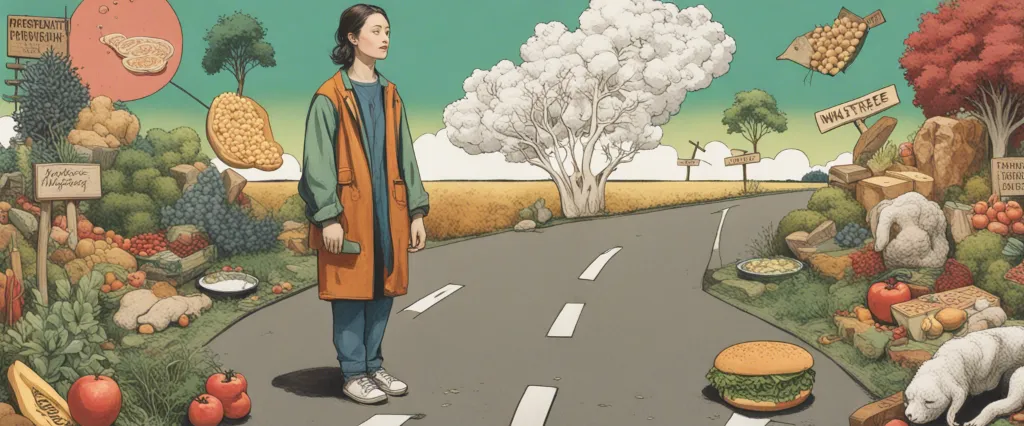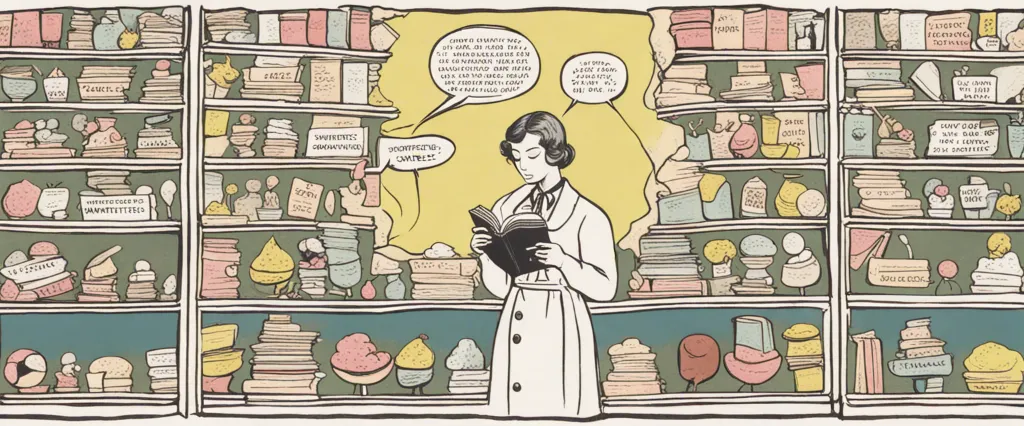——Sweetness and Power by Sidney W. Mintz & The Omnivore’s Dilemma by Michael Pollan

In the ever-evolving realm of food, two groundbreaking literary works have emerged as thought-provoking explorations of society’s relationship with what we consume. Sidney W. Mintz’s seminal work, “Sweetness and Power,” and Michael Pollan’s critically acclaimed book, “The Omnivore’s Dilemma,” shed light on different aspects of food consumption and its impact on culture, history, and the natural world. While both books examine the interconnectedness of food, they approach the subject through distinct lenses, providing a unique perspective on how the choices we make as omnivores shape our lives and the world around us.
Published in 1985, “Sweetness and Power” takes us on a captivating journey through the history of sugar, revealing its far-reaching influence on global economies, social structures, and cultural practices. Mintz skillfully weaves together ethnographic research, historical analysis, and economic theory to uncover the untold story of this ubiquitous substance. By tracing the origins of sugar from its roots in the Caribbean to its eventual domination of Western diets, Mintz delves into the complex dynamics of power, capitalism, and colonialism that shaped the sugar industry.
On the other hand, Pollan’s “The Omnivore’s Dilemma,” released in 2006, serves as a contemporary investigation into the multifaceted choices we face in our modern food system. With a focus on the United States, Pollan examines the ecological, political, and ethical implications of our food choices, emphasizing the impact they have on our health, the environment, and the broader food industry. Through vivid storytelling and immersive research, Pollan guides us through four distinct food chains – industrial, organic, local, and foraged – providing a comprehensive analysis of the challenges and opportunities that exist within each.
While both Mintz and Pollan delve deep into the intricate web of food systems, their approaches offer contrasting perspectives. Mintz’s historical perspective uncovers the enduring legacy of sugar’s influence on society, while Pollan’s contemporary investigation confronts our modern food system head-on. Both authors employ meticulous research and engaging narratives to shed light on the societal implications of our culinary choices.
By probing the themes of power, culture, sustainability, and consumer agency, these two books invite readers to critically examine their own relationship with food. As we embark on this comparative study of “Sweetness and Power” and “The Omnivore’s Dilemma,” we will delve deeper into the rich tapestry of ideas and arguments presented by Mintz and Pollan. In doing so, we will gain a deeper understanding of the complexities inherent in our food choices and begin to appreciate the profound influence these choices have on our lives, the environment, and the wider world.
Brief Summary of Two Books
Sweetness and Power by Sidney W. Mintz
Sweetness and Power: The Place of Sugar in Modern History” is a book written by Sidney W. Mintz, a social anthropologist, in 1985. The book explores the history and significance of sugar in society, particularly focusing on its impact on Europe and the Americas from the 17th to the 19th century.
Mintz begins by discussing the rise of sugar as a commodity in Europe and its connection to colonialism. He explains how the cultivation of sugar cane in the Caribbean and other tropical regions fueled the expansion of the Atlantic slave trade, as plantation owners required a large labor force to cultivate and harvest the crops.
The book delves into the impact of sugar on the economic and social structures of both colonial and post-colonial societies. Mintz explores how sugar consumption became a marker of social status and how it shaped notions of luxury and indulgence. He also examines how the industrialization of sugar production led to a significant decrease in prices and made it more accessible to the working class.
Mintz argues that sugar became a central element of capitalist societies, influencing the development of consumer culture, global trade, and the formation of modern diets. He delves into the influence of sugar on changing eating habits, the emergence of new food industries, and the impact of sugar consumption on public health.
Throughout the book, Mintz provides a detailed historical analysis, drawing on various sources such as memoirs, travelogues, and economic records. He explores the cultural meanings assigned to sugar, ranging from being a symbol of wealth and status to its associations with sweetness and pleasure.
Overall, “Sweetness and Power” illuminates the complex history of sugar, shedding light on its profound influence on social, economic, and cultural aspects of society. Mintz’s work encourages readers to question the origins and consequences of the foods they consume and examine the relationship between food, power, and social dynamics.
The Omnivore’s Dilemma by Michael Pollan
The Omnivore’s Dilemma” by Michael Pollan is a thought-provoking and investigative exploration of what we eat and how it affects our health and the environment. The book is divided into three main parts, each focusing on a different type of food production.
In the first section, Pollan traces the origins of our modern industrial food system. He explains that the dilemma faced by humans, who are capable of consuming a wide range of food, is deciding what to eat. He examines how industrial agricultural practices have transformed our food supply, resulting in an overabundance of corn and corn-derived products in our diets. Pollan delves into the negative consequences of this system, including the unsustainable farming practices, the reliance on fossil fuels, and the negative impact on animal welfare.
The second part of the book takes a closer look at organic farming and the rise of the organic food movement. Pollan focuses on one particular farm in Virginia and explores the struggles and challenges faced by organic farmers. Through his experiences, he highlights the benefits of organic farming, such as the use of natural fertilizers, crop rotation, and healthier animal husbandry practices.
In the final section, Pollan investigates the concept of “beyond organic” food, which encompasses sustainable and socially responsible food choices. He delves into the ethics and implications of hunting and gathering food by exploring the world of foraging and hunting for a meal. He also raises important questions about the impact of our food choices on ecosystems, biodiversity, and the overall health of the planet.
Overall, “The Omnivore’s Dilemma” encourages readers to reflect on their food choices, to understand the consequences of how our food is produced, and to consider alternative and sustainable ways of eating. Pollan challenges readers to become more mindful and conscious consumers, showing that every food choice we make has deeper implications for our health, society, and the environment.
Comparison between Two Books

Similarities in Food Culture
Both “Sweetness and Power” by Sidney W. Mintz and “The Omnivore’s Dilemma” by Michael Pollan explore the concept of food culture and its profound influence on society. While the focus of these two books differs in terms of time period and specific topics, there are several key similarities in their overarching discussions about food culture.
1. Social and Historical Perspective: Both books take a sociocultural approach to understanding food. They look beyond simply nourishment and examine the broader social, economic, and historical contexts that shape food production, consumption, and culture.
2. Power Dynamics: Both authors emphasize the significant role of power dynamics in shaping food culture. Mintz explores how colonialism and capitalism impacted the production and consumption of sugar, while Pollan delves into the dominance of industrial agricultural processes and the influence of corporations on the food system.
3. Relationships between Food and Identity: Both books examine the ways in which food shapes individual and collective identities. Mintz examines the cultural significance of sugar, while Pollan explores the impact of different food choices on personal identity and the development of food culture.
4. Environmental Impact: Both authors address the environmental consequences of our food choices. Mintz briefly touches upon the ecological impact of sugar production, and Pollan extensively discusses the negative effects of industrial agriculture and the benefits of sustainable farming practices.
5. Global Perspective: Both books acknowledge the global interconnectedness of food culture. Mintz explores the global trade networks that arose as a result of sugar production, while Pollan highlights the global reach of industrial agriculture and the importance of understanding our food’s origins.
6. Critique of Modern Food System: Both authors critique the contemporary food system. Mintz discusses the exploitative nature of sugar production and its impact on labor, while Pollan criticizes the monoculture and reliance on processed foods in industrial agriculture.
7. Importance of Food Rituals and Tradition: Both books emphasize the value of food rituals and traditions as integral parts of food culture. Mintz explores the historical and cultural significance of sugar consumption in various societies, while Pollan highlights the role of food rituals in connecting us to our natural environment.
Overall, both “Sweetness and Power” and “The Omnivore’s Dilemma” share the common theme of food culture as a potent force that shapes society, identity, power dynamics, and environmental impact. They challenge readers to critically examine the food choices we make and their wider implications in our world.
Divergences in Food Culture
Sweetness and Power by Sidney W. Mintz and The Omnivore’s Dilemma by Michael Pollan are two highly acclaimed works that explore different aspects of food culture. While both books provide valuable insights into the history, production, and consumption of food, they diverge in their focus and approach.
In Sweetness and Power, Mintz examines the role of sugar in shaping modern society and the global economy. He delves into the history of sugar production, tracing its origins in Southeast Asia and its transformative impact on European and American societies. Mintz argues that sugar played a pivotal role in the development of capitalism, colonization, and the rise of consumer culture. His book focuses on the structural and political aspects of food culture, exploring the power dynamics behind the sugar industry and its effects on labor, class, and social hierarchies.
On the other hand, The Omnivore’s Dilemma by Michael Pollan delves into the complex relationship between people and their food, tracing the various paths that food takes from the farm to our plates. Pollan explores three different food systems: industrial, organic, and foraging. He investigates the impacts of industrial agriculture, challenges the prevailing food narrative, and questions the ethics and environmental consequences of modern food production. Rather than focusing on a specific food item like sugar, Pollan explores the broader food culture prevalent in contemporary society.
The divergence in these books lies in their scope and focus. While Sweetness and Power provides a macro-level analysis of a specific food item and its impact on society, The Omnivore’s Dilemma takes a more comprehensive approach, considering various food systems and their effects on individuals, communities, and the environment. Mintz’s book offers a historical analysis of food culture, while Pollan’s work examines the contemporary food landscape and challenges readers to reconsider their relationship with food.
Furthermore, Mintz’s book primarily focuses on the economic and social implications of the sugar industry, while Pollan delves deeper into the cultural and personal aspects of food consumption. He explores our food choices, the hidden costs of industrialization, and the importance of understanding where our food comes from. Pollan’s emphasis on the act of eating and its connections to personal health and environmental sustainability sets his book apart from Mintz’s more sociopolitical analysis.
In conclusion, while both Sweetness and Power and The Omnivore’s Dilemma explore food culture, they diverge in their scope, focus, and approach. Mintz’s book provides a historical analysis of the sugar industry and its impact on society, whereas Pollan’s work offers a broader examination of contemporary food systems and their cultural, personal, and environmental implications.

Conclusion
Both Sweetness and Power by Sidney W. Mintz and The Omnivore’s Dilemma by Michael Pollan are highly regarded books that offer valuable insights into different aspects of food and its significance in society. It ultimately depends on what you are looking to explore and which topic resonates with you more.
If you are interested in understanding the historical and cultural impact of sugar on societies, as well as its connections to power structures and colonization, then Sweetness and Power would be a great choice. It delves into the social and economic history of sugar, offering a comprehensive analysis of its global impact.
On the other hand, if you are interested in exploring the complexities of current food systems and the environmental, health, and ethical implications of our food choices, then The Omnivore’s Dilemma would be more suitable. Pollan investigates different food production methods, from industrial farming to organic agriculture, and challenges readers to reconsider their relationship with food.
Both books provide important perspectives on food and its broader implications, so it is difficult to say which one is more worthy of reading. Consider your particular interests and choose the book that aligns more closely with them. Alternatively, you may also choose to read both books to gain a broader understanding of the topic.


